Marc Nash's Blog, page 57
June 21, 2012
Human Marks Of Divinity - Fridayflash
He'd been following the short man with a limp for a few months now. Clearly both were creatures of habit, standing at the same place along their respective railway platforms each day. Boarding the commuter train in the same carriage, exiting by the same door. They never once acknowledged each other in that way men don't.
He only noticed the man's tattoo once the belated arrival of Summer entailed that the smaller man donned shorts. Shorts that came well down the truncated leg, but shorts all the same. Following in the other's wake at a distance that allowed for the splay of his gammy leg, he espied something winking at him from the man's calf. Whatever it was quickly resheathed itself beneath the trouser fabric, like a puppet diving back behind the curtain. But each forward motion hoisted the cloth up once again and manifested a tattoo to him.
His first thought was wondering why it adorned the back of the leg, a place where the man himself would seldom be able to view it. Perhaps the tattoo was some sort of plaintive runic inscription to cure his lameness. It certainly did seem to be calligraphic rather than pictorial, though it was an indeterminate script to his eye at this distance. He wanted to move closer to try and pierce the words, but the dragging leg formed its own natural buffer zone. Besides he was struck that were this a woman he was pursuing, any further incursion of personal space would have been both unseemly and threatening.
Perhaps the man's lover traced over the characters with her fingers when they were in bed together. That she 'read' his flesh, which would have entailed him lying flat on his stomach. He shook the unsettling notion clear from his squirming mind and dropped back a pace or two from the man. More of the tattoo seemed to be insinuating itself at him from beneath the fabric. Maybe his counterpart was speeding up, further stretching his twisted leg.
The inked flow appeared to run down the leg rather than across it. He speculated that it may have been Chinese. Some wisdom of Confucius or the I-Ching perhaps? The man himself certainly wasn't Oriental. But then David Beckham was hardly a denizen of ancient Rome as he misspelled his Latin inscriptions upon the vellum of his own skin. The harder he peered, the more the characters seemed to twitch and flex.
What he really needed to do was to wrestle the man to the ground and satisfy his own burning curiosity. But grappling with a dwarf? That was just too unseemly.
*
She sported the sandalwood paste Tilaka as a mark of her credo. Those in the know would recognise at a stroke her religious affiliations. Those not in the know demonstrated their ignorance by playfully pressing it and demanding what pushing the red button on her forehead actually did. Beyond pushing her invisible button that was. One didn't require a third eye to see into the closed hearts of these host citizens.
But recently even those of her own kind had inflamed her. Since they regarded her mark as definitively casting her into a caste and not one graced with favour as they went to war with each other in this land far from home. A displacement of the insecurities of exile as they turned in on one another. The host citizens turned away and let them get on with paying their blood debts.
*
He held the power of light in his hand. Concentrated, portable, the pent up energy of the universe cradled in his palm. Lean, streamlined and sucking the heat from his skin. He screwed the laser sight on to his sniper's rifle, brought it up to his eye and squinted the other shut. He started playing it over those in the market square some thousand yards away. As invisible as a god.
The red dab pinpointed various parts of people's anatomy as he ranged over them. The stigmata marking the power of life and death he wielded. God might fabricate tissue and muscles and organs, but with his high-powered projectile spitting fire, he could reverse that process and expose the hollowness of the Lord's creation in a bloody spume.
He trained the red laser on the back of a man's calf while he stood at a market stall inspecting its wares. No doubt haggling and chiselling with the vendor in their tired, time-honoured way. Solely serving to reinforce an etiquette of acquiescence and submissiveness. He could cut him down to true size, simply by delivering a shot right now. See him crumple to the ground, clutching his shattered leg. Make him- any of them- dance like the marionettes looped on string that they were. The man's life hung by a thread, he could bend him utterly to his will. The red Mark of Cain would see to that.
He veered his rifle away and bounced his laser into a woman's eyes. Reflexively she jerked her head away and put her hand to her forehead to shield her eyes. Another dumb puppet marching to his tune. She didn't even look around her for the source of her discomfort. Evidently such turning away of her face happened frequently enough for her not to challenge it. She clearly was not worthy of his divine imprimatur.
This wasn't some mote they can just bat away with a hand. For he was Lord of Flies. The movies always showed the devil with burning red eyes. They got that right at least. Although his oracular oracle was Cyclopean.
He matched his red spot to the cosmetic red dot on the forehead of a young woman. Straight between the eyes. Aligning it perfectly, the symmetry appealed to him. Were he to press the trigger now, the two red circles would be expunged by a hole of similar diameter, tingeing black around its perimeter. Until a fresh dribble of red emerged from the hollow. Third eye my eye he thought to himself as he swung the rifle across the vista. The red circle settled across the temple of a child. Was it a child, or just a very small adult? He already appeared to be limping...
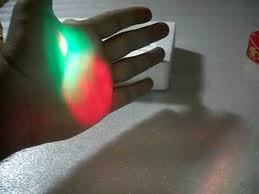
Published on June 21, 2012 14:25
June 14, 2012
Tea Mobile - Friday Flash

The bone china tea service had seen better days. But then which of us hadn't? Although the colour glaze had lost its original lustre, it had outlasted her own marriage, for which as a wedding gift it had helped launch and then faithfully service through the years. Not that her marriage had broken up prematurely, perish the thought. But cracked and chipped as the bone china was, it still retained more integrity than her husband lying mouldering in a grave.
Such china contained bone ash, from the calcination of bones. Her husband hadn't been cremated. The teacup she took out from the cupboard had a rusty ring lining its interior. But then the entire service was similarly tarnished. Since the pair of them had drunk a copious amount of tea over the years. She liked to imagine it was akin to the rings inside tree trunks that marked off years of life. The undertaker had asked her whether she wanted him to be buried with his wedding ring, or whether she wanted it back which she affirmed. Only now she thought she may have made the wrong decision. For every cup here bore a ring symbolising their union. Their hours shared in this house. Round this very table, even if she now only set one cup down on it, the ring reminded her of him. Sat alone, with her hands wrapped around a teapot full of warm liquid trying to derive warmth from it. She still brewed enough for two.
The kettle chorusing its boiled readiness, she poured the steaming water into the teapot, letting it stew for exactly the duration required for a perfect strength. At the precise moment she cupped a strainer beneath the lip of the spout, and dipped the teapot to decant the golden brown liquid into a battered thermos flask. She added some milk and stirred it in with a long handled steel spoon that she'd purloined from a restaurant when it had arrived accompanying a dessert sorbet. The handle made it the perfect length for just such a task. She screwed the plastic lid back on to the thermos, slipped it in a supermarket "Bag For Life", something she had availed herself of when she went shopping to prepare the food for the post-funeral convocation, grabbed her handbag and scuttled out of the house. The heaped leaves remained abandoned in the strainer. Left alone in life now, she no longer had any need to read them to discern her fate.
After a slow walk to the park, she plopped herself down on a weather-beaten bench. The bird droppings had long dried to blend lumpishly with the fibre of the wood. Like her china, it too had been stripped of its glaze. This had been 'their' bench. They had fed the birds from here together. Until the park-keepers threatened them with a banning order.
She removed the thermos from the rough hemp supermarket bag and set it next to her on a slat. Then she opened her handbag and removed one of her china tea cups. A jogger passing by caught sight of her manoeuvre and raised a quizzical eyebrow, though he didn't break his stride. It wasn't a reaction she hadn't encountered before. People couldn't fathom why with a ready made vessel in the shape of the flask's cup, this dotty old woman would bring out a teacup from her handbag. Like some unexpected conjuring trick. But if there was one thing she and her husband had always agreed on throughout their shared lives, it was that tea tasted best when served in bone china.
Have tea, will travel. Not quite the rituals of the Japanese Way Of Tea ceremony, but honouring the leaf all the same. Her little finger extended away from the teacup handle, though these days it was bent and gnarled by arthritis. Her head bobbed down towards the cup, rather than bringing the cup up to her lips. From a distance, she looked like one of those perpetual drinking bird toys. She must have taken tiny sips, for the imbibing took an age.
And yet despite the reverence displayed for the libation, for the memory of her husband, she rounded off the ritual in the most inelegant and unceremonious fashion imaginable. She inverted the teacup and thrust it repeatedly in the direction of the ground. This time any stray looks from passers-by registered a greater level of incomprehension.
If she didn't want the tea contaminating the inside of her handbag, provisioning herself with a tea towel or a less conspicuous tissue, would have served to ensure that no dregs could leak from the cup. She seemed so organised in everything else around this endeavour, concern for her handbag could not have been the sole issue. It was as if by such an action, she was banishing everything from inside the china vessel. Not just the liquid residue, but memories too. The brown ring of decay however remained ingrained on the white bone of course. She would never be able to shake that clear from the teacup.
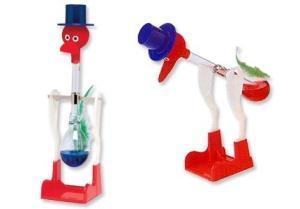
Published on June 14, 2012 14:23
June 10, 2012
A Writer's Journey In Pictures
Yesterday I attended The Literary Consultancy's conference on Writing in A Digital Age conference, part of which saw selected literary agents and publishers having to do a 7 minute, 21 slide presentation & talk on their professional life and loves. I thought this was a really neat idea and so have nicked it for my blog, albeit with text rather than voice and 15 images rather than 21. But then hey, I'm a writer, although I nearly didn't choose that path...
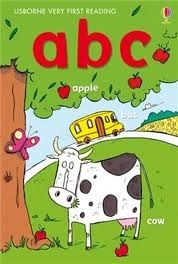
I can't remember learning to read. I have absolutely no recollection of the process, whether it was secured through a combination of my parents and early schooling. One of my twin sons taught himself to read by the time he attended nursery school. But I don't believe he inherited that gene from me.

Yet learn to read I must have. Though I wasn't a child fan of reading. (even today the notion of Young Adult literature is utterly alien to me). I was more into playing sports in the garden. What little I did read as a child were the picture books Asterix The Gaul and Tintin. The only books I read without pictures were those I was made to read at school, all of which I have burned out of my memory other than "Stig of The Dump" and "Cider With Rosie" which I loathed.
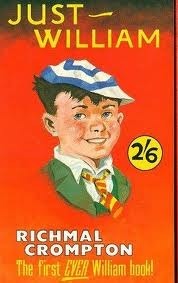
One other thing I did read was the "Just William" series, after my Dad presented me with a family heirloom, his original 1920s editions of the books that he had inherited from a family member. I did read and enjoy these, though I wouldn't say I devoured them. I have subsequently handed them to my own bookworm son who has utterly devoured them. Sadly nearing 100 years old they are looking the worse for wear now.
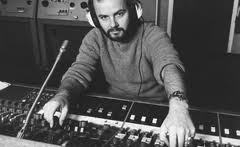 If I wasn't sneaking my torch under the bedclothes to read, it was because that cache was taken up by a small transistor radio. I used to listen to DJ John Peel's radio show from 10pm to midnight as he broke punk rock and reggae to my tender ears. Books never even got a look in as even today (how very undigital of me) I can't read with music on. My first aborted novel paid tribute to this well worn adolescent prostration before the shrine of Uncle John Peel.
If I wasn't sneaking my torch under the bedclothes to read, it was because that cache was taken up by a small transistor radio. I used to listen to DJ John Peel's radio show from 10pm to midnight as he broke punk rock and reggae to my tender ears. Books never even got a look in as even today (how very undigital of me) I can't read with music on. My first aborted novel paid tribute to this well worn adolescent prostration before the shrine of Uncle John Peel.
Music and reading finally coalesced at age 14, when an older cousin of mine suggested I listen to The Cure track "Killing An Arab" and then read Albert Camus' book "The Outsider". I dutifully did both in the quest for coolness points to spread around school, always fed to us by older brothers and relatives. I was blown away by the book and voluntarily, that is of my own free will, got Camus' "The Plague" out of the library and tore into that. Reading wise it means I have never looked back. Literally, since to this day I still have not read the vast majority of the Classics written in the nineteenth century.
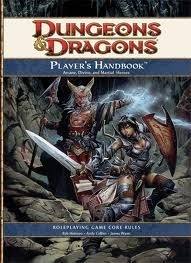 Somewhat surprisingly to me even, I plumped for doing A-Level English Literature, despite my complete lack of any grounding in the canon. Shakespeare was okay, Chaucer was a linguistic chore but sufficiently cheeky to be tolerable, Milton's "Paradise Lost" was cool cos it gave me ideas about Devils and monsters to feed into being a Dungeon Master hosting games with my mates (yes we were sad pre-Geeks), but Jane Austen, Sylvia Plath and Tom Stoppard really didn't float my boat. I attained a very middling Grade B.
Somewhat surprisingly to me even, I plumped for doing A-Level English Literature, despite my complete lack of any grounding in the canon. Shakespeare was okay, Chaucer was a linguistic chore but sufficiently cheeky to be tolerable, Milton's "Paradise Lost" was cool cos it gave me ideas about Devils and monsters to feed into being a Dungeon Master hosting games with my mates (yes we were sad pre-Geeks), but Jane Austen, Sylvia Plath and Tom Stoppard really didn't float my boat. I attained a very middling Grade B.
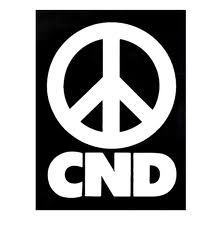 And then comes the great turning out. When you raise your head above the snail shell of domesticity and start confronting/engaging with the world. I got into politics, mainly through the increasing volume of the Campaign for Nuclear Disarmament as American airforce bases on UK soil took root and politicians talked of neutron bombs that killed people but left property standing as they blithely considered mutually assured destruction. I wanted to be in a band, not that I could play any instrument. I was going to be the singer and therefore began to write cod lyrics, protest songs about MAD and even worse poetry. But they were quite conceptual. Early seeds...
And then comes the great turning out. When you raise your head above the snail shell of domesticity and start confronting/engaging with the world. I got into politics, mainly through the increasing volume of the Campaign for Nuclear Disarmament as American airforce bases on UK soil took root and politicians talked of neutron bombs that killed people but left property standing as they blithely considered mutually assured destruction. I wanted to be in a band, not that I could play any instrument. I was going to be the singer and therefore began to write cod lyrics, protest songs about MAD and even worse poetry. But they were quite conceptual. Early seeds...
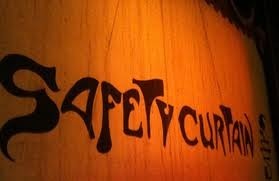 I was so disillusioned with my experience at University, I was ready to walk out. What saved me was the fact that there were lots of free theatre stages and a plethora of wannabe actors and directors among the student body. So I wrote plays and could experiment with no fear of consequence. Having written a single 30 minute play, that year I went up to the Edinburgh Fringe festival with two new plays which I'd written in about 2 months. Crazy!
I was so disillusioned with my experience at University, I was ready to walk out. What saved me was the fact that there were lots of free theatre stages and a plethora of wannabe actors and directors among the student body. So I wrote plays and could experiment with no fear of consequence. Having written a single 30 minute play, that year I went up to the Edinburgh Fringe festival with two new plays which I'd written in about 2 months. Crazy!
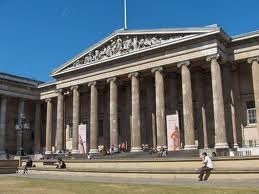 When I left college, being a professional playwright struck me as a great way to avoid the rat race. I blagged my way into an exclusive reading card for the British Library on the basis of a paper I was delivering back at my old college on the punk and football subcultures, which needed, um research. For three years or so I read all manner of material in this amazing library. Under the Cupola dome and wondering if I was sat in the same seat as Karl Marx did (hope not as he had boils and piles), this was the most conducive space for learning and research that I've ever experienced. I haven't been in the new british Library, but I can't see how they could recreate the atmosphere of learning. On a couple of occasions I ordered what were considered naughty books, (one bizarrely was a history of the Tarot) and had to go to the special Reading Room where you were under strict observation. Alexander Trocchi's book "Thongs" was another such book that sent me there.
When I left college, being a professional playwright struck me as a great way to avoid the rat race. I blagged my way into an exclusive reading card for the British Library on the basis of a paper I was delivering back at my old college on the punk and football subcultures, which needed, um research. For three years or so I read all manner of material in this amazing library. Under the Cupola dome and wondering if I was sat in the same seat as Karl Marx did (hope not as he had boils and piles), this was the most conducive space for learning and research that I've ever experienced. I haven't been in the new british Library, but I can't see how they could recreate the atmosphere of learning. On a couple of occasions I ordered what were considered naughty books, (one bizarrely was a history of the Tarot) and had to go to the special Reading Room where you were under strict observation. Alexander Trocchi's book "Thongs" was another such book that sent me there.
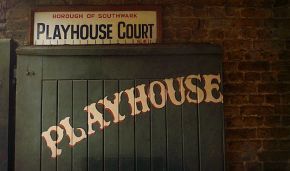 Where did all that research lead? To a few productions of my short plays, and particularly my week long run of my full-length play "Walking With Mr Brownstone" at the Southwark Playhouse. A play about a fetus addicted to heroin in utero, which played with notions of reality and inner and outer. I became really interested in form and movement on stage rather than the words.
Where did all that research lead? To a few productions of my short plays, and particularly my week long run of my full-length play "Walking With Mr Brownstone" at the Southwark Playhouse. A play about a fetus addicted to heroin in utero, which played with notions of reality and inner and outer. I became really interested in form and movement on stage rather than the words.
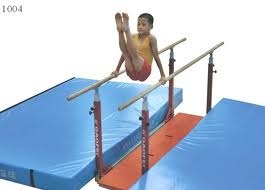 I had hoped the play would get picked up and transfer for a longer run. At the time my wife was pregnant with our twins and the actress playing the fetus who did most of the show on gymnastic parallel bars also found out she was pregnant during the week run. Must have been odd for her to be pregnant while acting a fetus spinning round on the bars. End of run and when my twins came along, end of theatre career as I couldn't really spend the time hanging out in theatre bars.
I had hoped the play would get picked up and transfer for a longer run. At the time my wife was pregnant with our twins and the actress playing the fetus who did most of the show on gymnastic parallel bars also found out she was pregnant during the week run. Must have been odd for her to be pregnant while acting a fetus spinning round on the bars. End of run and when my twins came along, end of theatre career as I couldn't really spend the time hanging out in theatre bars.
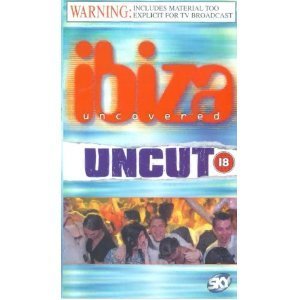 After finally emerging from the fog of rearing two babies through sleepless nights, I was ready to resume my writing. But writing what? I turned to prose as I set about an idea that had been gnawing at me for a while but which could never have been done as a play (apart from one scene which actually appears in the novel as a mini stage play). I have no idea where the idea came from, but its world was derived from watching those MTV programmes through the baby-rearing night such as "Ibiza Uncovered" and "Holiday Reps". The British behaving badly when they go abroad as tourists.
After finally emerging from the fog of rearing two babies through sleepless nights, I was ready to resume my writing. But writing what? I turned to prose as I set about an idea that had been gnawing at me for a while but which could never have been done as a play (apart from one scene which actually appears in the novel as a mini stage play). I have no idea where the idea came from, but its world was derived from watching those MTV programmes through the baby-rearing night such as "Ibiza Uncovered" and "Holiday Reps". The British behaving badly when they go abroad as tourists.
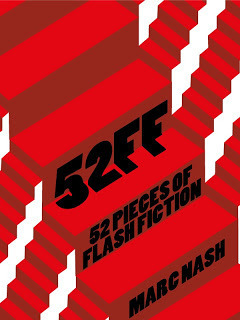
I self-published that debut novel and then took 6 months off from new writing for marketing it. Part of that did in fact involve new writing as I discovered the joys of flash fiction, stories of 1000 words or less. I could find time to do one of these a week, post it to the blog and keep up some level of visibility and traffic. After a year of this, I found that I had my second book title ready made, 52 flash fiction stories. Marketing turned out to be fun and creative after all.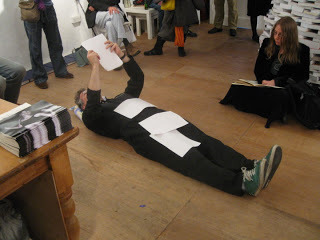
When I do live readings, I like to try and work out why I'm reading that piece to that particular audience at that time. This often means dressing up in costume, or as the photo above at Art Jericho in Oxford, performing in a style that fit exactly with the work itself. Here I'm slowly covering myself in the pieces of paper with my text while lying down as the narrator in the story is. I think I have quite a dull reading voice, so I like to put on a bit of a show to make it more interesting. There's nothing quite beats reading live to people. You can feel the atmosphere in the room change with your text.
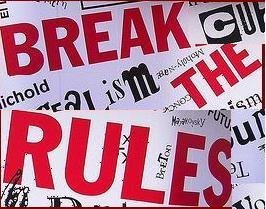 I am a self-taught writer. I have attended no creative writing classes and as shown above, have read very little in the classical literary canon. But through my voracious appetite for contemporary fiction, plus maybe with my background in playwriting, I have a different approach to notions of story. The worst thing you can say to me is you have to abide by the rules of writing. The next worst thing, is that you have to know the rules before you break them. I have some very different ideas on certain established elements of literature, around story, character, character arcs, hero and the nature of fiction itself. I'm not trying to establish these as a definitive new set of writing rules, they are simply ones I'm interested in exploring through my writing. That's the future course of my writing life. Wonder what images it will cast up.
I am a self-taught writer. I have attended no creative writing classes and as shown above, have read very little in the classical literary canon. But through my voracious appetite for contemporary fiction, plus maybe with my background in playwriting, I have a different approach to notions of story. The worst thing you can say to me is you have to abide by the rules of writing. The next worst thing, is that you have to know the rules before you break them. I have some very different ideas on certain established elements of literature, around story, character, character arcs, hero and the nature of fiction itself. I'm not trying to establish these as a definitive new set of writing rules, they are simply ones I'm interested in exploring through my writing. That's the future course of my writing life. Wonder what images it will cast up.
Thanks for reading.

I can't remember learning to read. I have absolutely no recollection of the process, whether it was secured through a combination of my parents and early schooling. One of my twin sons taught himself to read by the time he attended nursery school. But I don't believe he inherited that gene from me.

Yet learn to read I must have. Though I wasn't a child fan of reading. (even today the notion of Young Adult literature is utterly alien to me). I was more into playing sports in the garden. What little I did read as a child were the picture books Asterix The Gaul and Tintin. The only books I read without pictures were those I was made to read at school, all of which I have burned out of my memory other than "Stig of The Dump" and "Cider With Rosie" which I loathed.

One other thing I did read was the "Just William" series, after my Dad presented me with a family heirloom, his original 1920s editions of the books that he had inherited from a family member. I did read and enjoy these, though I wouldn't say I devoured them. I have subsequently handed them to my own bookworm son who has utterly devoured them. Sadly nearing 100 years old they are looking the worse for wear now.
 If I wasn't sneaking my torch under the bedclothes to read, it was because that cache was taken up by a small transistor radio. I used to listen to DJ John Peel's radio show from 10pm to midnight as he broke punk rock and reggae to my tender ears. Books never even got a look in as even today (how very undigital of me) I can't read with music on. My first aborted novel paid tribute to this well worn adolescent prostration before the shrine of Uncle John Peel.
If I wasn't sneaking my torch under the bedclothes to read, it was because that cache was taken up by a small transistor radio. I used to listen to DJ John Peel's radio show from 10pm to midnight as he broke punk rock and reggae to my tender ears. Books never even got a look in as even today (how very undigital of me) I can't read with music on. My first aborted novel paid tribute to this well worn adolescent prostration before the shrine of Uncle John Peel.Music and reading finally coalesced at age 14, when an older cousin of mine suggested I listen to The Cure track "Killing An Arab" and then read Albert Camus' book "The Outsider". I dutifully did both in the quest for coolness points to spread around school, always fed to us by older brothers and relatives. I was blown away by the book and voluntarily, that is of my own free will, got Camus' "The Plague" out of the library and tore into that. Reading wise it means I have never looked back. Literally, since to this day I still have not read the vast majority of the Classics written in the nineteenth century.
 Somewhat surprisingly to me even, I plumped for doing A-Level English Literature, despite my complete lack of any grounding in the canon. Shakespeare was okay, Chaucer was a linguistic chore but sufficiently cheeky to be tolerable, Milton's "Paradise Lost" was cool cos it gave me ideas about Devils and monsters to feed into being a Dungeon Master hosting games with my mates (yes we were sad pre-Geeks), but Jane Austen, Sylvia Plath and Tom Stoppard really didn't float my boat. I attained a very middling Grade B.
Somewhat surprisingly to me even, I plumped for doing A-Level English Literature, despite my complete lack of any grounding in the canon. Shakespeare was okay, Chaucer was a linguistic chore but sufficiently cheeky to be tolerable, Milton's "Paradise Lost" was cool cos it gave me ideas about Devils and monsters to feed into being a Dungeon Master hosting games with my mates (yes we were sad pre-Geeks), but Jane Austen, Sylvia Plath and Tom Stoppard really didn't float my boat. I attained a very middling Grade B. And then comes the great turning out. When you raise your head above the snail shell of domesticity and start confronting/engaging with the world. I got into politics, mainly through the increasing volume of the Campaign for Nuclear Disarmament as American airforce bases on UK soil took root and politicians talked of neutron bombs that killed people but left property standing as they blithely considered mutually assured destruction. I wanted to be in a band, not that I could play any instrument. I was going to be the singer and therefore began to write cod lyrics, protest songs about MAD and even worse poetry. But they were quite conceptual. Early seeds...
And then comes the great turning out. When you raise your head above the snail shell of domesticity and start confronting/engaging with the world. I got into politics, mainly through the increasing volume of the Campaign for Nuclear Disarmament as American airforce bases on UK soil took root and politicians talked of neutron bombs that killed people but left property standing as they blithely considered mutually assured destruction. I wanted to be in a band, not that I could play any instrument. I was going to be the singer and therefore began to write cod lyrics, protest songs about MAD and even worse poetry. But they were quite conceptual. Early seeds...
 I was so disillusioned with my experience at University, I was ready to walk out. What saved me was the fact that there were lots of free theatre stages and a plethora of wannabe actors and directors among the student body. So I wrote plays and could experiment with no fear of consequence. Having written a single 30 minute play, that year I went up to the Edinburgh Fringe festival with two new plays which I'd written in about 2 months. Crazy!
I was so disillusioned with my experience at University, I was ready to walk out. What saved me was the fact that there were lots of free theatre stages and a plethora of wannabe actors and directors among the student body. So I wrote plays and could experiment with no fear of consequence. Having written a single 30 minute play, that year I went up to the Edinburgh Fringe festival with two new plays which I'd written in about 2 months. Crazy!
 When I left college, being a professional playwright struck me as a great way to avoid the rat race. I blagged my way into an exclusive reading card for the British Library on the basis of a paper I was delivering back at my old college on the punk and football subcultures, which needed, um research. For three years or so I read all manner of material in this amazing library. Under the Cupola dome and wondering if I was sat in the same seat as Karl Marx did (hope not as he had boils and piles), this was the most conducive space for learning and research that I've ever experienced. I haven't been in the new british Library, but I can't see how they could recreate the atmosphere of learning. On a couple of occasions I ordered what were considered naughty books, (one bizarrely was a history of the Tarot) and had to go to the special Reading Room where you were under strict observation. Alexander Trocchi's book "Thongs" was another such book that sent me there.
When I left college, being a professional playwright struck me as a great way to avoid the rat race. I blagged my way into an exclusive reading card for the British Library on the basis of a paper I was delivering back at my old college on the punk and football subcultures, which needed, um research. For three years or so I read all manner of material in this amazing library. Under the Cupola dome and wondering if I was sat in the same seat as Karl Marx did (hope not as he had boils and piles), this was the most conducive space for learning and research that I've ever experienced. I haven't been in the new british Library, but I can't see how they could recreate the atmosphere of learning. On a couple of occasions I ordered what were considered naughty books, (one bizarrely was a history of the Tarot) and had to go to the special Reading Room where you were under strict observation. Alexander Trocchi's book "Thongs" was another such book that sent me there.
 Where did all that research lead? To a few productions of my short plays, and particularly my week long run of my full-length play "Walking With Mr Brownstone" at the Southwark Playhouse. A play about a fetus addicted to heroin in utero, which played with notions of reality and inner and outer. I became really interested in form and movement on stage rather than the words.
Where did all that research lead? To a few productions of my short plays, and particularly my week long run of my full-length play "Walking With Mr Brownstone" at the Southwark Playhouse. A play about a fetus addicted to heroin in utero, which played with notions of reality and inner and outer. I became really interested in form and movement on stage rather than the words.
 I had hoped the play would get picked up and transfer for a longer run. At the time my wife was pregnant with our twins and the actress playing the fetus who did most of the show on gymnastic parallel bars also found out she was pregnant during the week run. Must have been odd for her to be pregnant while acting a fetus spinning round on the bars. End of run and when my twins came along, end of theatre career as I couldn't really spend the time hanging out in theatre bars.
I had hoped the play would get picked up and transfer for a longer run. At the time my wife was pregnant with our twins and the actress playing the fetus who did most of the show on gymnastic parallel bars also found out she was pregnant during the week run. Must have been odd for her to be pregnant while acting a fetus spinning round on the bars. End of run and when my twins came along, end of theatre career as I couldn't really spend the time hanging out in theatre bars.
 After finally emerging from the fog of rearing two babies through sleepless nights, I was ready to resume my writing. But writing what? I turned to prose as I set about an idea that had been gnawing at me for a while but which could never have been done as a play (apart from one scene which actually appears in the novel as a mini stage play). I have no idea where the idea came from, but its world was derived from watching those MTV programmes through the baby-rearing night such as "Ibiza Uncovered" and "Holiday Reps". The British behaving badly when they go abroad as tourists.
After finally emerging from the fog of rearing two babies through sleepless nights, I was ready to resume my writing. But writing what? I turned to prose as I set about an idea that had been gnawing at me for a while but which could never have been done as a play (apart from one scene which actually appears in the novel as a mini stage play). I have no idea where the idea came from, but its world was derived from watching those MTV programmes through the baby-rearing night such as "Ibiza Uncovered" and "Holiday Reps". The British behaving badly when they go abroad as tourists.

I self-published that debut novel and then took 6 months off from new writing for marketing it. Part of that did in fact involve new writing as I discovered the joys of flash fiction, stories of 1000 words or less. I could find time to do one of these a week, post it to the blog and keep up some level of visibility and traffic. After a year of this, I found that I had my second book title ready made, 52 flash fiction stories. Marketing turned out to be fun and creative after all.

When I do live readings, I like to try and work out why I'm reading that piece to that particular audience at that time. This often means dressing up in costume, or as the photo above at Art Jericho in Oxford, performing in a style that fit exactly with the work itself. Here I'm slowly covering myself in the pieces of paper with my text while lying down as the narrator in the story is. I think I have quite a dull reading voice, so I like to put on a bit of a show to make it more interesting. There's nothing quite beats reading live to people. You can feel the atmosphere in the room change with your text.
 I am a self-taught writer. I have attended no creative writing classes and as shown above, have read very little in the classical literary canon. But through my voracious appetite for contemporary fiction, plus maybe with my background in playwriting, I have a different approach to notions of story. The worst thing you can say to me is you have to abide by the rules of writing. The next worst thing, is that you have to know the rules before you break them. I have some very different ideas on certain established elements of literature, around story, character, character arcs, hero and the nature of fiction itself. I'm not trying to establish these as a definitive new set of writing rules, they are simply ones I'm interested in exploring through my writing. That's the future course of my writing life. Wonder what images it will cast up.
I am a self-taught writer. I have attended no creative writing classes and as shown above, have read very little in the classical literary canon. But through my voracious appetite for contemporary fiction, plus maybe with my background in playwriting, I have a different approach to notions of story. The worst thing you can say to me is you have to abide by the rules of writing. The next worst thing, is that you have to know the rules before you break them. I have some very different ideas on certain established elements of literature, around story, character, character arcs, hero and the nature of fiction itself. I'm not trying to establish these as a definitive new set of writing rules, they are simply ones I'm interested in exploring through my writing. That's the future course of my writing life. Wonder what images it will cast up.Thanks for reading.
Published on June 10, 2012 15:54
June 7, 2012
Middle Mass - Friday Flash
Just along from the everlasting tyre fire, was the electronic goods dumpsite. That pyre of the First World's hard-wearing hardware effluvia, loaded on to container ships and transported here for disposal. It was said that the country formerly hosted the sole man-made object visible from space (which was itself a fiction). Well now the country possessed the lone edifice properly able to lay claim to such a boast. Only it preferred to make no mention of its existence at all. A skyscraper of other people's scrap, was not held to be a feat for reflecting glory on a nation.
The congeries consisted of computers, portable devices and hard drives, e-readers, games consoles and mobile phones amongst other erstwhile essentials of life. I-Pads and I-Pods stripped of their individualising utility and discarded so as now presenting the collective problem of global riddance. All were simply poured on top of the extant cloud-bursting mound of the previous year's designs, like sprinkles on an ice cream sundae. Future archaeologists would have had perfectly veined strata to sift through and timeline our annual obsolescence precisely.
The sheer weight of the material served to compact the already digitally compressed. Degrading under the fierce heat, it had effectively formed a silicon compost heap. And one that also leached beryllium, cadmium. lead, mercury and all manner of toxic polymers. A syrupy river oozed out at the foot of the stack and coated the feet of the scavenger-workers. None of whom wore protective clothing. Many of whom were too indigent to even have their feet shod.
For there were tiny riches to be gleaned from the decaying e-carrion. Gold and silver and other precious metals could be reclaimed from the entrails. These could be sold to the itinerant scrap metal merchants. A more personal trove were the letter buttons that broke loose from computer keyboards. For in the few daylight minutes snatched away for breaks, the salvagers would paint characters and symbols on to the individual keys as they constructed mah jong sets of 136 of such tablet tiles. They were the cyber-scrimshaws of the modern age.
However, most recyclers died before they could complete their mah jong sets. Irrespective of the long-term toxic assault, they were more immediately liable to surrender their lives when pulling at something within the teetering pillar, or burrowing further in toward the middle of the monolith. Such actions would cross the precarious tipping point and set off a instrumental avalanche fatally swallowing them up in its tumulus.
Children with their sparrowlike mass and prehensile limbs, were highly valued for scrambling up the scarp face. But often they dislodged even a tiny component and sent it cascading back down the slope. Either lethally picking off a fellow forager below them on the ziggurat, or hitting an adult stood at its foot squarely between the eyes and killing them stone dead.
Yet such culls scarcely thinned out the workforce of collectors. For continual waves of the impoverished arrived from inland as frequently as the ships docked at harbour. The fresh grizzle-faced workforce knew the location. The pilots of the monster ships were also navigating to the destination with surety. Yet the rest of the world were seemingly not in the know. The deaths went unreported, entombed in the secret location just like the original builders of the pyramids of the Pharaohs. The downtrodden continued to be trodden down by the weltering mass of the world's detritus. A detritus that interlarded flesh and bone with the plastic and metal alloys.
Meanwhile, out in the online world formerly served by the equipment currently littering terra firma on the other side of the planet, an even greater albeit virtual tower was accreting at a yet swifter pace. A dump site where an ever-accelerating rate of depositing was taking place and one which fiercely, if not venomously, compacted and compressed its neighbours within the unseen dark heart of the steepling megalith. A megalith become cenotaph for the unknown souls impressed and lost inside. The middle strata condemned to invisibility.
This tower was made up of words. Written on the ether. Typed straight on to the face of the void. Since the First World required so much of its electronic kit in order to extrude and present its words. Words which they didn't conceive of as evanescent. Yet still in the main they disappeared without trace, against all their producers' wishes. Pressed instantly back and eclipsed by the next electronic onrush of published or broadcast verbiage. Overwriting the overwritten. The words actually possessed two levels of insubstantial chimerical existence. Firstly that effaced amidst the supersaturation of the information superhighway. Falling through the gossamer mesh of the world wide web. Compacted and pressed beyond sight by the heel of search engine optimisation jackbooting it into touch. The second, still cached within the RAM of those units heaped up in the electronic waste sites unseen. Virtual, potential words, not even extant in the virtual world.
Those who wrote warnings and reproaches about the exploitation and terrible conditions suffered by the landfill families, themselves suffered compression and accidental suppression as their words were submerged in the tidal flow. Their vaporous outpourings joined the virtual airfill, though unlike that of its material cousin on the opposite side of the globe, you couldn't see this from space. Or anywhere. Virtual container vessels docked at virtual ports, loaded up with the refuse of airy compositions and set off for the information dumpsite that exists, well where exactly? The last and lost domain, that of the middle mass. Future archaeologists of the virtual world, would have no possible way of unravelling these compacted layers.
"Middle Mass" - The Fall (The song doesn't really have anything to do with the story, other than it's title which stuck inside my head when starting out writing this tale).
Published on June 07, 2012 13:10
May 31, 2012
A Series Of False Endings - Friday Flash
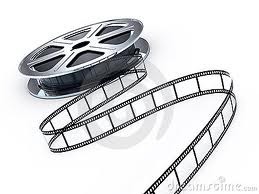
The emergency sirens were getting closer. The mob with their torches were raising their flambeaus in exultation, but saw them extinguished by the hovering helicopter looking for a place to land. Soldiers in fatigues were deploying and handing out blankets. The ticker tape parade was in full swing, though once the confetti landed on the concrete sidewalk, they were limply drenched by the hoses putting out the ground fires. The tribal warrior was taking the plaudits from his people as he rode by them in his chariot. The girl kissed the man who had rescued her death-defyingly, though he flinched as her lips irritated the cut on his lip. Meanwhile overhead pyrotechnics lit up the sky with celebratory swashes of colour. Their detonations blotted out the sound of horns from the flotilla of ships returning triumphantly to harbour. The graduates threw their mortar boards into the air, while on the parade ground the police received their medals with due pomp.
He shouldn't have been quite so churlish. Disowning his own film because the Studio rejected his dark ending. Their test screenings, focus groups and guinea pigs, people who had never made a film in their life, YouTube not withstanding, had plumped for something more upbeat. And so he had ceded his opus to Alan Smithee, the hardest working director in Hollywood back in the day.
Out of pique he had spliced together a reel of all the hackneyed endings to films he could find and now sat watching it on an endless loop. His own original celluloid having long since shrivelled into dust. He who had been charged with chronicling the world through his imagination, now left without a camera to record anything. Just a projector to relay this degraded version of it instead. Here in his self-enforced seclusion, now the last witness to the fate of mankind. Following the ravages of wars and genocides. The inundations of toxic waste, biological mutation and terrorist inspired nuclear contamination. Rising tidal waters and tsunamis. The assault of solar radiation through the Earth's denuded Maginot Line of ozone and magnetic fields.
The last man on earth, one of its most eloquent examiners, stripped of any means of self-expression. Of any audience remaining to report to. There were no focus groups now. He wound the spool of film around his neck and looped it over the curtain rail. Alan Smithee's final stand as he kicked the best supporting chair away from under him. The definitive ending that his magnum opus had demanded all those years ago, but which had been prettified by the Studio. If anything, he hadn't been dark enough in the original.
Note: Alan Smithee is the name given to the director of any film disowned by its actual director. This has now been replaced by the name Thomas Lee.
I'll be reading this story and two others at The Stoke Newington Literary festival this Sunday from 3pm. Venue The Baby Bathhouse, 125 Stoke Newington Church Street, London, N16
Published on May 31, 2012 14:27
May 24, 2012
Dirty Money - Friday Flash
This one didn't even make it into my new flash anthology "16FF"!

At age thirteen I came into quite a considerable sum of money. Courtesy of my father of course. Not by way of any tasteful convention through a legacy. Since he wasn't dead, far from it. But it was purely and simply because I was his son.
In this religion our family paid chapped lip service to, a boy supposedly became a man when he reached that callow age. For the mere public demonstration of having learned to speak in tongues, or a specific alien variant of it at least, strange people would come up to me, ruffle my hair, pinch my cheek and pronounce me the spit of my father and then press a cream envelope into my hand. Most managed to have my first name inked on them, but not all.
Since I barely knew these people. Friends of my parents, my father, who passed me like ships in the night as I scurried for the haven of my room when they came round for a dinner party, a card evening or a more casual drinks and natter. Any that I coincided no matter how briefly with in space, were usually appeased with an even more fleeting "Good evening" and I was released from further adult interaction. now at thirteen I found myself having to thank them, gurn as they touselled my carefully layered hair, or sucked in the smarting sensation after they pinched my skin that seemed to be on offer.
They were rewarding me not for anything I had done, few of them shared the family religion or appreciated the significance of its rite de passage. They were rewarding me for whose son I was. Their mate's progeny. Their large as life, good egg, top value- both socially and professional, pal. In their bourgeois you scratch my back, I'll scratch yours world, everything came down to an envelope of money. I felt myself being inducted into a different adult wisdom to that the religion had in mind. Genuinely more co-operative species remove parasites from each other. In those hard to get at places. They don't satisfy themselves with raking claws down the other's back. I didn't know how I knew at such a tender age, maybe that's what the religious fathers really meant by solemnising this occasion, but I knew when those friends turned up at our house with their wives, they were being unfaithful to them.
When I was sixteen, I took a decision. I started seeing a psychoanalyst in secret. There were Oedipal conflicts to be resolved that was for sure. I went privately so as not to leave a paper trail and funded it from my nest egg as soon as I could legally access it. Nest egg, yes we'll pass on the obvious symbolism of the maternal egg for now shall we?
More often than not, lying there on a couch in a room heated to hospital ward swelter, I fell asleep for my fifty minutes. Ironic seeing as anxiety dreams peppering my disturbed nights, were the ostensible reason for my attendance there. For his part, when he deigned to offer comment in the skimpy house style, he opined that at least it showed I felt secure enough in his room and in his presence to fall asleep. Yeah, two different meanings of the word security rubbing up against one another there I reckoned. My zoning out, aka emotional security, his financial security. Must have been the easiest cash he ever earned.
Came the point where I had no lucre left to continue the alleged treatment. We talked about and around the issue (issue, that's funny, being another word for bank notes, a connection he failed to make, though of course the issue of a parent...) We agreed that such money had been dirty in my eyes because of its source. In that laconic way of his, I think he was trying to finesse me into opening up negotiations with him about staying on, paying a lower rate (though is that all the value I placed on myself?), which also might entail me earning it and thereby make me engage more with reality. But I refused to take his bait. My first salary just to pay his bills? How self-involved could a man be? Maybe he anticipated me going cap in hand to my father. We agreed to terminate our sessions, both imagining that it had been of some utility, though I suspect his notion being far more therapeutic than that of my own. For me, it was more transfer than transference.
My secret leaked out eventually. I was ready to walk out of my University course before even completing the first year. I was unenthused by having to interpret the great works of literature through the prisms of Marx and Freud, but that was all the course seemed to offer. As if I wasn't well versed in both of those theories already, having helped empty my life of meaning and value (there is no such thing as surplus value).
As my father berated me for lacking staying power, for ever seeing anything through, for the blow to his prestige, I committed the error of commenting how my further education was likely to bankrupt me. My Shrink no doubt would have said that I had done so deliberately.
"What about your savings? There must be oodles of cash built up in there by now? It's meant for things like this, to set you up in life".
"I laundered it".
"You laundered it? What does that even mean? Laundered it? What, like it was drug cartel money or something?"
"Some sore of cartel yes".
He just looked at me with complete incomprehension. He couldn't recognise me at all. Certainly not as his own son.
Which is where all this started. Money received under false pretences. Mistaken identity. Job done I'd say.
Time to go out into the real world and assert myself.
Published on May 24, 2012 14:43
May 20, 2012
The Bereaved And The Bereft
 It is a little remarked tragedy that several of the terminal illnesses that conduct a human spirit off this earth, also have the unfortunate tendency to reduce the full functioning of body and mind and return them to the state of the dependent infant. Just as we entered life with requirements of feeding, dressing, bathing and assisting with toilet by others, so can the days leading up to exiting this life be filled with the same physical functions beholden unto others.
It is a little remarked tragedy that several of the terminal illnesses that conduct a human spirit off this earth, also have the unfortunate tendency to reduce the full functioning of body and mind and return them to the state of the dependent infant. Just as we entered life with requirements of feeding, dressing, bathing and assisting with toilet by others, so can the days leading up to exiting this life be filled with the same physical functions beholden unto others.This entails round the clock care, with most of the burden often falling upon the family. Especially if the dying person has requested to die at home. And such a fraught responsibility often opens up fissures within the family that just make the whole pressurised process unbearable.
When a child tends for their parent, it throws up many agonies. Firstly the life-long balance of the relationship is inverted. Seeing your forever powerful, protective and loving parent reduced to such impoverished powers just doesn't compute. The parent, unlike a spouse or even our own offspring has been there every single day of our own lives. Their passing cannot but leave a hole. Additionally it reflects upon your own mortality, for here ineffably confronting the child is the fate that befalls us all, if our own titan of a parent succumbs then what chance us? So our familiar and comforting realities are asunder. In our own dismay and incomprehension, often the soon-to be bereaved lash out, because they cannot process these emotions.
One natural fault line for these feelings to follow is the division of labour of care. Families are not democracies and utopias. They have inequitable resources, means, childcare, job responsibilities. Members may not even reside in the same city or country. We also possess different thresholds of what we can tolerate when it comes to physical human frailties. Some will happily clean up soil, whereas others simply cannot no matter how much they may wish to contribute. The burden will always fall disproportionately upon some shoulders more than others. And that is before you have considered the emotional inequalities, of how each sibling feels towards their parents.
They shouldn't, but very often parents have favourites. The first born; the youngest; the one often most overlooked in the middle, who the parent made sure to keep an eye out for; the one most like the parent; the one most different (my father favours the one of my twin sons who has inherited the fewest of our family genes, since he is full of self-loathing for his own appearance). Such little yet lingering resentments burst out at these times, if the near-bereaved start hurling accusations of not pulling weight. The charge that so and so is doing less, is often met with the gripe that the accuser was always the parent's favourite anyway.
I have to admit finding this hard to stomach. What are the reasons for caring for an ailing family member? Love is hopefully the sole drive. An unconditional one that you do it because you want to do it. In which case what does it matter how much or little other family members contribute to the care regimen? Of course it isn't always solely love that provides the motivation. It can be out of a sense of obligation, familial duty or even guilt. Less than ideal causes, ones in which the petty resentments can easily perch in amongst the crevices and erupt when it all gets too much, or is prompted during arguments with other family members.
We are only human. So to my mind, no one has the right to lambast any one else for what care they may or may not be contributing. We each can only do what we can do. Arguments and negative emotions during the parent's last days can be of no possible help whatsoever and make the process of grieving way harder. The family circle changes shape when a parent is removed by death. Surely the way to reconfigure and re-sutre the shape of the family in the aftermath is to permit each member to emerge with a clean sheet as soon as the care period has unfortunately ended. That petty resentments are not allowed to persist. That the family unites and accepts one another with unconditional love. That no one is to be judged, only re-embosomed. What better legacy for the passing parent to cede than a reunification?
I'm not saying it's easy and desperate raw emotions are flying around at such times. But if families could keep this aim in sight it may, just may help them to come to terms both individually and together with their awful loss.

Published on May 20, 2012 10:54
May 19, 2012
Competition!
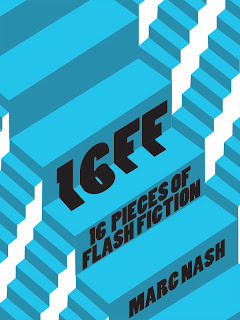
Competition
To celebrate the launch of my new short flash fiction anthology "16FF", I am running a unique competition.
The Prize:
Your own personal Flash Fiction story written by me, based on a prompt, or theme, or word, or set of words given by you. It will be a unique story that only you and I will possess! It will not be available anywhere else unless you decide to make it available. It will be available in PDF and Kindle-friendly format.
How To Enter:
E-mail me via sewell.d at googlemail dot com with no more than 50 words on which of these stories was your favourite and why, by October 31st 2012 and I will pick a winner. I'll contact the winner and ask them for their prompt. The story will be delivered before Christmas 2012.
Published on May 19, 2012 02:38
May 16, 2012
National Flash Fiction Day
Today, May 16th is the inaugural National Flash Fiction Day. There's a raft of readings, workshops and events, whose details you can find on the NFFD website.
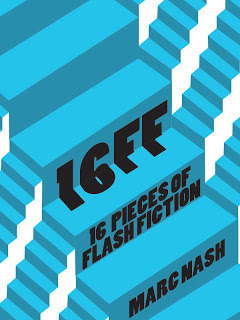 My contribution is to release a new short anthology of 16 flash stories on kindle called "16FF" for the princely sum of £1.53 or $2.99. 16 brand spanking new tales written after my first anthology of 52 stories was published. That anthology "52FF" is free to download just for National Flash Fiction Day.
My contribution is to release a new short anthology of 16 flash stories on kindle called "16FF" for the princely sum of £1.53 or $2.99. 16 brand spanking new tales written after my first anthology of 52 stories was published. That anthology "52FF" is free to download just for National Flash Fiction Day.
And to hopefully whet your appetites for the anthology, here is one of the tales called "New Balls Please"
*
"Mind over matter of course!"
"Nonsense, matter over mind every time".
"Never the mind, what does either of it matter?" The synthesised supercomputer voice blithely emitted no emotion behind such a momentous condensing of the question that had plagued mankind since the dawn of time. Nor was there betrayal of any self-congratulation at the wordplay which served to diminish the puffed-up portentousness of that same human quest. A quest its circuits had been arrogated to. The computer's voice programme had been selected after various investigations into which timbre and accent was the most dulcet on the human ear. Thus it had been cast as female, with a soft sibilant Scottish brogue. Populous denizen of the customer service industry. There to be of soothing help. For when the human race's machines went on the fritz and failed to function properly.
"What does that even mean?"
"Bit glib for a computer?"
"So I have managed to unify mind and matter after all". There was a beat as the two human inquisitors reflexively left a space for the reciter of a joke to fill in with its own self-satisfied chortle. But none followed, for machines don't laugh (though Caledonian women have been known to, particularly when sufficiently oiled).
"No you're right. Back to the matter in question".
"See, you can't even avoid using the word 'matter'. That's how fundamental it is to existence. Everything stems from matter, including that beloved consciousness of yours".
"Okay then. where does it reside? Which of these wrinkles in this pickled walnut of yours is 'consciousness'? Where within this precious prune's synaptic networks does self-awareness perch?"
If the computer could compute that it should laugh uproariously at this point, it would have. But its powering light indicators remained steadily even."If I may interject-"
One of the advocates pointed an open palm as invitation to the computer. Even though the machine had a visual scanning apparatus, the gesture itself was too symbolic for it to comprehend. The man cursed himself, while his antagonist just smirked.
"A physical gesture, yet our silicon friend here was unable to process either its significance or meaning. Probably due to it being devoid of awareness. Fifteen-love to me I believe".
"Interesting too, that such a physical endeavour as playing sport, should have such a symbolic scoring system too, don't you think?"
"If I may interject- Thank you..." Interesting too that the designers had programmed the AI neural network with the human standards of etiquette and politeness. Laughter, that trespasser of etiquette, was ostensibly too human to be mimetically reproduced in the non-human. But etiquette, being itself a code, well that was deemed acceptably artificial. Besides, it wouldn't do to have two or more voices talking over one another. Legibility would disintegrate. "You are one and the same. You are genetic information that codes to create matter-"
"Aha! See! Genetic code is consciousness in potentia, as much as it is embryonic matter".
"But DNA is a molecule. And last time I looked, molecules were forms of matter. DNA still has physical form, whatever enlarged, complex shape it goes on to unpack".
Again the computer had halted its flow for the human interjections. Though unlike a human it has no difficulty in picking up precisely where it left off and without any degrading of throughput.
"Respectfully, as I intimated, it's both and it's neither. DNA is information that codes to produce other bodies of information, in order to transmit itself into future generations. The host bodies, be they human, gazelle or virus, are perishable. Their senses, experiences and memories are non-transferable, certainly beyond their lifespans. They are vessels, designed for merely passing on information. Labouring under the misconception that their own information, of sights, sounds and smells are the significant data, for such is consciousness".
"Vessels?"
"Illusory consciousness?"
"Steady on there!"
"Hold on just a minute".
This time, the hiatus beat may just have been the interval of two gasted flabbers.
"Information is the only significant entity that exists. Not mind. Not matter. Not even viruses or particles. Coded bytes of information solely prevail through time".
"Of course you'd say that, what are you but a data processor? A purveyor of information. But who programmed you in the first place? You only possess existence through the agency of human consciousness".
"Also ask yourself why DNA gets passed down the generations? It needs us, our physical being to be expressed, in order to reproduce and transmit it".
"Of course. But for what purpose does DNA or any information transmit itself? Its transmission is utterly blind. It is a self-perpetuation without any reason behind it. The preservation of information for information's sake. Information cannot be destroyed".
"Oh really?"
"Yeah, you don't say...?"
And with that, one of the inquisitors launched a kick at the computer. His compatriot ran off in the other direction, but soon returned carrying a fire extinguisher, with which he proceeded to bludgeon the machine.
"Love-fifteen... Love-thirty... Love-forty... Game, set and match I'd say".
The computer was a mess of smoke and electric sparks fizzing across exposed entrails. Its indicator lights slowly extinguished.
"Okay computer, are you seriously telling me that a disembodied parcel of information just did that to you? No, it was a physical force wrought by a lump of matter, wielding another metal cluster of matter-"
"Designed by man's consciousness".
"Whatever".
"Don't overlook that the intention to batter the machine communicated itself from your consciousness in the first place. Prompted by your emotions, firing every one of your muscles and nerves".
"Nevertheless, there sits a burned out cluster of matter. I don't see the persistence of any consciousness, or information there. So appears we did manage to destroy information after all".
"Not permanently. We shot the messenger was all. Mind is still preserved. We still retain the knowledge to build and programme another apparatus".
"Only, one that will play ball with us this time".
"Actually giving us the answers we're seeking".
"The right kind of answers to settle our disputes".
"One which understands us humans better".
"More sympathetic to our needs".
"It's just a question of mind over matter".
"Matter over mind you mean".
 My contribution is to release a new short anthology of 16 flash stories on kindle called "16FF" for the princely sum of £1.53 or $2.99. 16 brand spanking new tales written after my first anthology of 52 stories was published. That anthology "52FF" is free to download just for National Flash Fiction Day.
My contribution is to release a new short anthology of 16 flash stories on kindle called "16FF" for the princely sum of £1.53 or $2.99. 16 brand spanking new tales written after my first anthology of 52 stories was published. That anthology "52FF" is free to download just for National Flash Fiction Day.And to hopefully whet your appetites for the anthology, here is one of the tales called "New Balls Please"
*
"Mind over matter of course!"
"Nonsense, matter over mind every time".
"Never the mind, what does either of it matter?" The synthesised supercomputer voice blithely emitted no emotion behind such a momentous condensing of the question that had plagued mankind since the dawn of time. Nor was there betrayal of any self-congratulation at the wordplay which served to diminish the puffed-up portentousness of that same human quest. A quest its circuits had been arrogated to. The computer's voice programme had been selected after various investigations into which timbre and accent was the most dulcet on the human ear. Thus it had been cast as female, with a soft sibilant Scottish brogue. Populous denizen of the customer service industry. There to be of soothing help. For when the human race's machines went on the fritz and failed to function properly.
"What does that even mean?"
"Bit glib for a computer?"
"So I have managed to unify mind and matter after all". There was a beat as the two human inquisitors reflexively left a space for the reciter of a joke to fill in with its own self-satisfied chortle. But none followed, for machines don't laugh (though Caledonian women have been known to, particularly when sufficiently oiled).
"No you're right. Back to the matter in question".
"See, you can't even avoid using the word 'matter'. That's how fundamental it is to existence. Everything stems from matter, including that beloved consciousness of yours".
"Okay then. where does it reside? Which of these wrinkles in this pickled walnut of yours is 'consciousness'? Where within this precious prune's synaptic networks does self-awareness perch?"
If the computer could compute that it should laugh uproariously at this point, it would have. But its powering light indicators remained steadily even."If I may interject-"
One of the advocates pointed an open palm as invitation to the computer. Even though the machine had a visual scanning apparatus, the gesture itself was too symbolic for it to comprehend. The man cursed himself, while his antagonist just smirked.
"A physical gesture, yet our silicon friend here was unable to process either its significance or meaning. Probably due to it being devoid of awareness. Fifteen-love to me I believe".
"Interesting too, that such a physical endeavour as playing sport, should have such a symbolic scoring system too, don't you think?"
"If I may interject- Thank you..." Interesting too that the designers had programmed the AI neural network with the human standards of etiquette and politeness. Laughter, that trespasser of etiquette, was ostensibly too human to be mimetically reproduced in the non-human. But etiquette, being itself a code, well that was deemed acceptably artificial. Besides, it wouldn't do to have two or more voices talking over one another. Legibility would disintegrate. "You are one and the same. You are genetic information that codes to create matter-"
"Aha! See! Genetic code is consciousness in potentia, as much as it is embryonic matter".
"But DNA is a molecule. And last time I looked, molecules were forms of matter. DNA still has physical form, whatever enlarged, complex shape it goes on to unpack".
Again the computer had halted its flow for the human interjections. Though unlike a human it has no difficulty in picking up precisely where it left off and without any degrading of throughput.
"Respectfully, as I intimated, it's both and it's neither. DNA is information that codes to produce other bodies of information, in order to transmit itself into future generations. The host bodies, be they human, gazelle or virus, are perishable. Their senses, experiences and memories are non-transferable, certainly beyond their lifespans. They are vessels, designed for merely passing on information. Labouring under the misconception that their own information, of sights, sounds and smells are the significant data, for such is consciousness".
"Vessels?"
"Illusory consciousness?"
"Steady on there!"
"Hold on just a minute".
This time, the hiatus beat may just have been the interval of two gasted flabbers.
"Information is the only significant entity that exists. Not mind. Not matter. Not even viruses or particles. Coded bytes of information solely prevail through time".
"Of course you'd say that, what are you but a data processor? A purveyor of information. But who programmed you in the first place? You only possess existence through the agency of human consciousness".
"Also ask yourself why DNA gets passed down the generations? It needs us, our physical being to be expressed, in order to reproduce and transmit it".
"Of course. But for what purpose does DNA or any information transmit itself? Its transmission is utterly blind. It is a self-perpetuation without any reason behind it. The preservation of information for information's sake. Information cannot be destroyed".
"Oh really?"
"Yeah, you don't say...?"
And with that, one of the inquisitors launched a kick at the computer. His compatriot ran off in the other direction, but soon returned carrying a fire extinguisher, with which he proceeded to bludgeon the machine.
"Love-fifteen... Love-thirty... Love-forty... Game, set and match I'd say".
The computer was a mess of smoke and electric sparks fizzing across exposed entrails. Its indicator lights slowly extinguished.
"Okay computer, are you seriously telling me that a disembodied parcel of information just did that to you? No, it was a physical force wrought by a lump of matter, wielding another metal cluster of matter-"
"Designed by man's consciousness".
"Whatever".
"Don't overlook that the intention to batter the machine communicated itself from your consciousness in the first place. Prompted by your emotions, firing every one of your muscles and nerves".
"Nevertheless, there sits a burned out cluster of matter. I don't see the persistence of any consciousness, or information there. So appears we did manage to destroy information after all".
"Not permanently. We shot the messenger was all. Mind is still preserved. We still retain the knowledge to build and programme another apparatus".
"Only, one that will play ball with us this time".
"Actually giving us the answers we're seeking".
"The right kind of answers to settle our disputes".
"One which understands us humans better".
"More sympathetic to our needs".
"It's just a question of mind over matter".
"Matter over mind you mean".
Published on May 16, 2012 03:44



